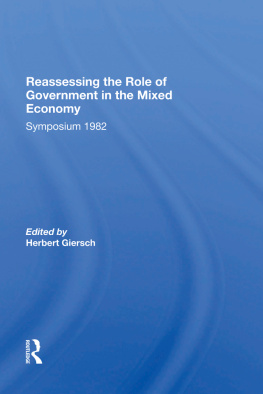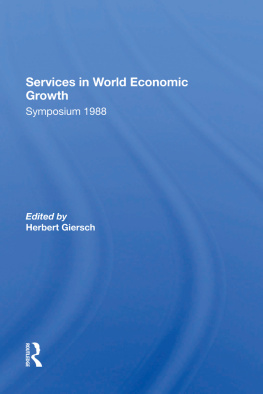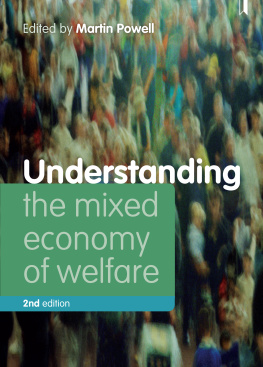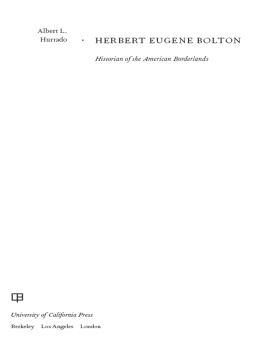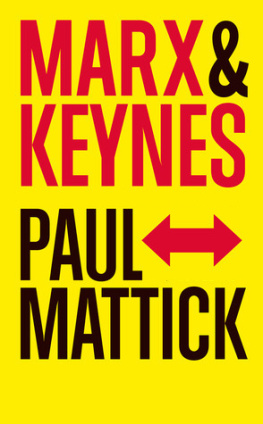Herbert Giersch - Reassessing/ Avail. Hc. Only! The Mixed Economy
Here you can read online Herbert Giersch - Reassessing/ Avail. Hc. Only! The Mixed Economy full text of the book (entire story) in english for free. Download pdf and epub, get meaning, cover and reviews about this ebook. year: 2019, publisher: Taylor & Francis Group, genre: Politics. Description of the work, (preface) as well as reviews are available. Best literature library LitArk.com created for fans of good reading and offers a wide selection of genres:
Romance novel
Science fiction
Adventure
Detective
Science
History
Home and family
Prose
Art
Politics
Computer
Non-fiction
Religion
Business
Children
Humor
Choose a favorite category and find really read worthwhile books. Enjoy immersion in the world of imagination, feel the emotions of the characters or learn something new for yourself, make an fascinating discovery.
- Book:Reassessing/ Avail. Hc. Only! The Mixed Economy
- Author:
- Publisher:Taylor & Francis Group
- Genre:
- Year:2019
- Rating:5 / 5
- Favourites:Add to favourites
- Your mark:
- 100
- 1
- 2
- 3
- 4
- 5
Reassessing/ Avail. Hc. Only! The Mixed Economy: summary, description and annotation
We offer to read an annotation, description, summary or preface (depends on what the author of the book "Reassessing/ Avail. Hc. Only! The Mixed Economy" wrote himself). If you haven't found the necessary information about the book — write in the comments, we will try to find it.
Reassessing/ Avail. Hc. Only! The Mixed Economy — read online for free the complete book (whole text) full work
Below is the text of the book, divided by pages. System saving the place of the last page read, allows you to conveniently read the book "Reassessing/ Avail. Hc. Only! The Mixed Economy" online for free, without having to search again every time where you left off. Put a bookmark, and you can go to the page where you finished reading at any time.
Font size:
Interval:
Bookmark:
Institut fr Weltwirtschaft an der Universitt Kiel

52 Vanderbilt Avenue, New York, NY 10017
2 Park Square, Milton Park, Abingdon, Oxon OX14 4RN
Product or corporate names may be trademarks or registered trademarks, and are used only for identification and explanation without intent to infringe.
Reassessing the role of government in the
mixed economy: symposium 1982 / ed. by Herbert
Giersch. Tbingen: Mohr, 1983.
ISBN 3.16.344674.4 kart.
ISBN 3.16.344675.2 Gewebe
Reassessing the role of government in the mixed economy / edited by
Herbert Giersch.
p. cm.(Publications of the Institute of World Economics,
University of Kiel)
Based on a symposium held by the Kiel Institute of World
Economics, June 23-25, 1982.
Includes bibliographies.
ISBN 0-8133-0598-5: $17.89
1. Economic policyCongresses. 2. Economic development
Political aspectsCongresses. 3. Mixed economyCongresses.
I. Giersch, Herbert. II. Universitt Kiel. Institut fr
Weltwirtschaft. III. Series.
HD73.R43 1987
338.9dc19 87-20142
CIP
Font size:
Interval:
Bookmark:
Similar books «Reassessing/ Avail. Hc. Only! The Mixed Economy»
Look at similar books to Reassessing/ Avail. Hc. Only! The Mixed Economy. We have selected literature similar in name and meaning in the hope of providing readers with more options to find new, interesting, not yet read works.
Discussion, reviews of the book Reassessing/ Avail. Hc. Only! The Mixed Economy and just readers' own opinions. Leave your comments, write what you think about the work, its meaning or the main characters. Specify what exactly you liked and what you didn't like, and why you think so.

